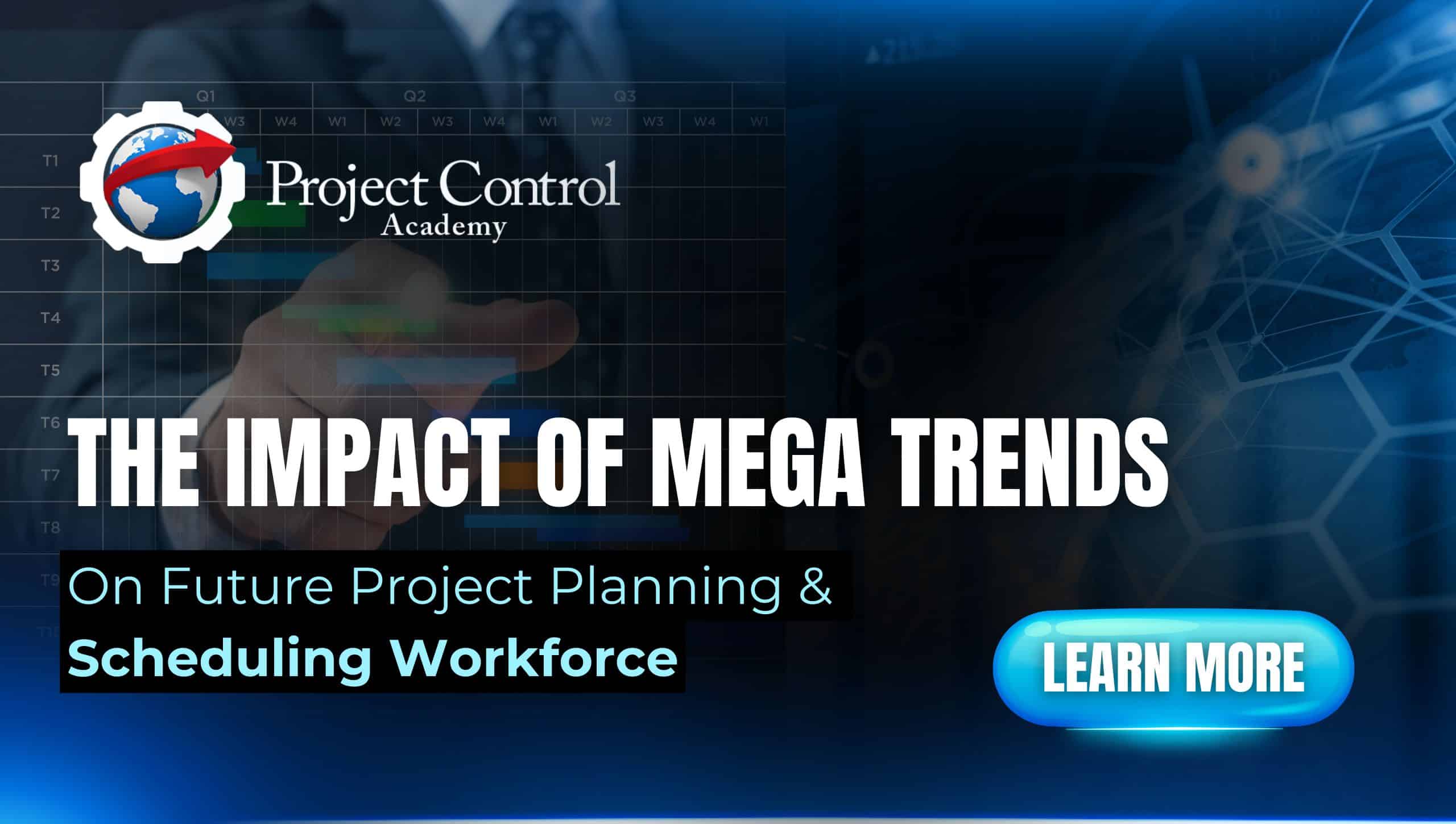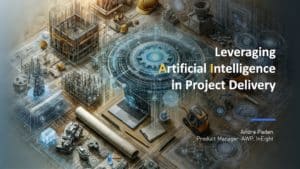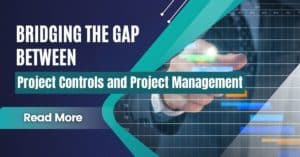Regardless of which industry you work in, you should always be forward-looking. Trends that are appearing in your industry today will likely have a drastic impact on the future of your career.
I had the opportunity to host a webcast with Laurie Bowman, talking about “How to Future-Proof Your Career in Project Planning & Scheduling.”
There are many popular trends in the project planning and scheduling industry today, which Laurie categorized into several “megatrends.” Each of these megatrends will impact the future project planning & scheduling workforce in a major way. By analyzing these trends, planning and scheduling professionals can design their professional development pathways to suit the job market of the future.
Here’s what Laurie had to say about the impacts of these megatrends on future project planning & scheduling workforce:
The Impact of “Society & Culture Trends” on Future Project Planning & Scheduling
Society and culture are evolving much more rapidly than anyone ever thought possible. Between increased global mobility, an aging population, changing work and career values, and increased urbanization, the world is very different today than how it was a few decades ago. These society and culture megatrends, however, have a very specific impact on the project planning and scheduling profession. The future of project planning and scheduling is one that will be more inclusive of age, experience, and gender.
Not only are there increasingly more opportunities for women in project controls and leadership, but the aging population will also play a huge role in the future of project controls.
The general population in developed countries is living much longer than ever before. So, the experienced professionals are actually remaining in the workforce much longer. However, in the next 10 years, younger generations will account to more than 60% of the workforce. At the same time, the younger generation is living in a world of constant technological advancements. Because of this, there are opportunities for senior planners to mentor the younger team members, while simultaneously being taught new techniques and tools.
The Impact of “Business & Economics Trends” on Future Project Planning & Scheduling
When it comes to business and economics trends in project planning and scheduling, there are quite a few.
Firstly, competition is crucial to success in project controls. For this reason, high-speed competition, start-up thinking, networking, knowledge-based economy, and changing workplace dynamics are all megatrends in the industry. While some trends can have a negative impact on the future of project planning, all of these megatrends will only improve the industry.
For example, changing workplace dynamics and start-up thinking will lend to more flexible work arrangements, like freelancing and working remotely. These work arrangements will not only give project planning and scheduling specialists more freedom but will also increase productivity.
Another popular business and economic trend at the moment is the growth of emerging markets. These emerging economies combined with the popularity of a knowledge-based economy will cause countries like Indonesia, China, and South Korea to attract highly skilled project control specialists from around the world. Therefore, there’s going to be a lot more demand for strong planners and schedulers, particularly in Asian countries.
The main business and economics megatrends will also lead to the implementation of artificial intelligence (AI) in project controls. Soon, many routines and repetitive project controls and planning and scheduling jobs will be automated. So roles requiring high levels of scheduling knowledge, creativity, and communication skills will be in high demand.
The Impact of “Digitization Trends” on Future Project Planning & Scheduling
Digitization refers to the general trend that technological advancements are taking over- but it’s not a bad thing. Increased digitization can have a positive impact on the relationships between businesses, as well as the interactions between employers and employees. Contrary to popular belief, digitization is rarely responsible for rendering employees jobless. Instead, digitization simply helps employees to do their jobs better and faster.
When it comes to the future of project planning & scheduling, digitization can help project planning and scheduling employees be more efficient at their jobs. Digitization will allow more seamless integration of data between schedules (e.g. 4D & 5D), cost, and ERP systems. There will be more diagnostic tools for schedule health analysis, forensic analysis, and risk analysis.
Digitization offers us greater opportunity for analysis and problem solving rather than compiling and reporting data manually. Digitization when applied correctly, can help all of us to become more efficient in the future.
The Impact of Artificial Intelligence (AI)/Virtual Reality (VR)/Augmented Reality (AR) Trends
Artificial intelligence, virtual reality, and augmented reality are all significant technological advancements that will have a major impact on the future of project controls. According to Laurie, “in the past 4 years, the number of startups involving AI has increased twenty-fold, so it is really booming and it’s going to impact anything.” AI has been implemented in one way or another in every single industry to improve performance. AI robots and programs can now do even the most complex of tasks.
While AI is quite helpful for project planning & scheduling, virtual reality (VR) and augmented reality (AR) will have the most significant impact on the future of project planning and scheduling. While AR and VR were originally used for gaming, these technological advancements have since been used in several other industries. In project controls, AR and VR can help improve the efficiency of the industry by allowing for the use of 3D models and easier communication, collaboration, and information sharing.
AI is expected to improve the strategic and decision-making processes when it comes to project planning and scheduling. In terms of AR and VR, their use in project controls will improve stakeholder and community engagement, as well as improve site planning and the monitoring of site progress using 3D models.
The Impact of “Big Data Trends” on Future Project Planning & Scheduling
Big Data is a popular and useful trend emerging as a result of increased digitization. Big Data refers to sets of data too large and complex to be analyzed by the human brain. Instead, they require computational analysis.
It’s important to realize that big data is more than just a big set of data. It’s not the amount of data that’s important; rather what organizations do with the data that matters. According to Laurie Bowman, “Big data is created by the systematic and often automated collection and mining and analysis of billions of different data points. So you can imagine how valuable big data would be from a project planning and control perspective, where you have large sets of organized data.”
The future of project planning and scheduling will be heavily impacted by the use of Big Data. Big Data can essentially transform the ways in which problems are solved. The use of Big Data gives us opportunities for the rapid production and optimization of schedules using historical data sets or “As-built” schedules. Big Data can help inform us about which projects to pursue, how to deliver projects, how to optimize project results, and more.
Being able to systematically analyze a large volume of data can provide more precise answers to complex problems.
The Impact of “Resource & Environment Trends” on Future Project Planning & Scheduling
There are major changes happening with our natural resources, as well as the environment. The longer we live on Earth, the faster our natural resources become depleted. Overuse of natural resources, as well as a better understanding of the environment, is indicative in several megatrends: international sustainability action, climatic weather shifts, and financial viability.
The push for international sustainability action will likely alter the future of project planning and scheduling. The desire for sustainability combined with recent technological advancements will result in improved decision-making using integrated schedule models, improved project performance, resource utilization, and community and stakeholder engagement. These impacts are largely due to advanced AI technology that can be used for risk modeling and decision optimization, as well as the use of complex virtual models.
The Impact of “Political Trends” on Future Project Planning & Scheduling
The world of politics has its influence on the workforce, as well. There are a few major political trends that will have a heavy impact on the future of project planning. The two most significant political trends in relation to project controls are innovation ahead of regulation and political instability.
Firstly, due to the rapid speed and quantity of technological advancements, the innovation of these advancements is much faster than their regulations. Technology develops much faster than appropriate regulations can be made. Second, the political instability caused by recent governmental elections around the world has proved that people can be unpredictable in their thought processes. This has made decision-making in project controls particularly difficult.
The impact of these major political trends on the future of project controls is varied. When it comes to project planning and scheduling, there will be a much higher demand for skills and knowledge. Both the governments and private employers will be looking for those with specialized skills and knowledge due to the rapidly developing technology. Some certifications they may look for include AACE International and PMI. Recent international political instability will also lead to changes in both the decision-making and planning processes.
In Conclusion
By analyzing these current megatrends, it’s easier to envision the future of project planning and scheduling, and project controls. When it comes down to it, being certified and having a wealth of experience is important- but it’s not everything. While hands-on experience and qualifications are important, being forward-thinking can really help propel your career. If you use today’s megatrends in the project planning and scheduling field to look towards the future, you can ensure that you’ll have a long and profitable career.
References
- “How to Future-Proof Your Career in Project Planning & Scheduling” Webcast Presented by Laurie Bowman in September 2018
Additional Resources:
- Future Skills and Training: A practical resource to help identify future skills and training was commissioned in June 2016 by the Australian Industry and Skills Committee (AISC)
- Ernst & Young (2016) The upside of disruption: Megatrends shaping 2016
- Deloitte Global Human Capital Trends survey, 2018.
- McKinsey Global Institute, The World at work: jobs, pay, and skills for 3.5 billion people, June 2012
- Logical Project Intelligence, 2018 Project Controls Survey Report
About Laurie Bowman

Laurie holds certifications for Planning and Scheduling Professional (PSP), Certified Cost Professional (CCP), Earned Value Professional (EVP) and Decision and Risk Management Professional (DRMP). Laurie instructs the PSP and EVP certification preparation courses on behalf of the AACE International Education board and is a registered mentor with both AACE International and Engineers Australia. He currently serves on the committee for Engineers Australia’s College of Leadership and Management in the Australian Capital Territory and serves as the AACE International Regional Director for the Asia Pacific (Region 8).
To connect with Laurie, please check his LinkedIn profile or his website.
About the Author, Shohreh Ghorbani
 Shohreh is the founder and director of Project Control Academy, the leading provider of comprehensive online training programs in Project Controls. Shohreh has served tens of thousands of professionals and several international corporations to build their technical Project Controls knowledge and shave off years of trial and error in learning the vital skills in controlling their projects.
Shohreh is the founder and director of Project Control Academy, the leading provider of comprehensive online training programs in Project Controls. Shohreh has served tens of thousands of professionals and several international corporations to build their technical Project Controls knowledge and shave off years of trial and error in learning the vital skills in controlling their projects.
Shohreh is a licensed project management professional (PMP) recognized by Project Management Institute (PMI) and holds a Master of Science in Industrial Engineering.
Connect with Shohreh via Facebook, LinkedIn, Instagram, YouTube







![[Free 90-min Masterclass] The Ultimate Leadership Recipe for Project Professionals](https://www.projectcontrolacademy.com/wp-content/uploads/2024/08/4-1024x576.jpg)















